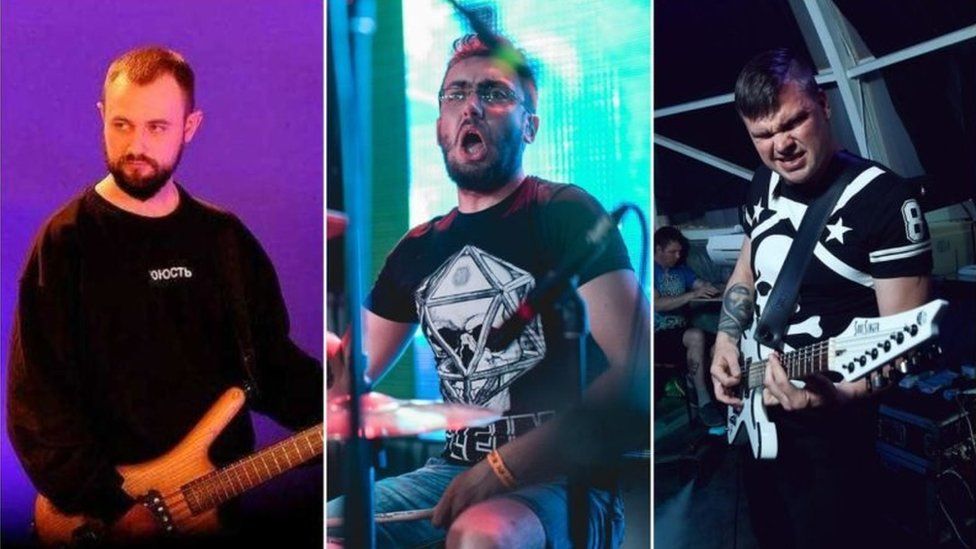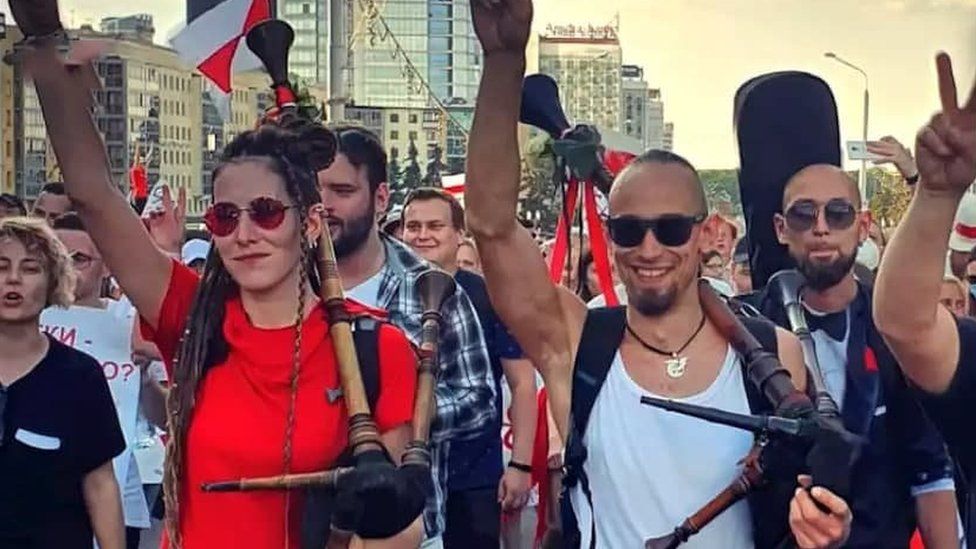
The songs of Tor Band have become a symbol of mass protests that spread across Belarus like wildfire when authoritarian leader Alexander Lukashenko remained in power after 2020 elections condemned by the West as fraudulent.
Tor Band leader Dzmitry Halavach has been given nine years in prison, Yauhen Burlo was jailed for eight years, and Andrei Yaremchyk for seven and half years.
Human rights groups speak of blacklists carrying the names of musicians, bands and artists banned from performing.
Those deemed “disloyal” to the Lukashenko government are often replaced with artists from Russia, says PEN Belarus, part of a worldwide association of writers which focuses on freedom of expression.
“Independent culture has literally returned to the practices of the Soviet era – it went underground,” said the group’s head, Tatyana Nyadbai.
The musicians of Tor Band were convicted in the southern city of Gomel last week of multiple criminal charges, including creating an “extremist formation” and insulting the Mr Lukashenko.
Their sentences have been condemned as “an unprecedented prison sentence for creativity” by Pavel Sapelka of the Viasna Human Rights Centre.
Belarus’s exiled opposition leader, Svetlana Tikhanovskaya, whose own husband is currently serving an 18-year jail sentence, wrote on social media: “Lukashenka’s regime shows its fear. Music can be silenced in courts, but never in our hearts.”
The band members were arrested in October 2022 after the biggest crackdown on protests under Lukashenko’s 30-year rule.

Many Belarusians have fled fearing for their lives, after thousands were arrested, assaulted and thrown in jail.
Mr Burlo was on crutches and unable to stand up to hear the verdict, Radio Free Europe’s Belarus Service reported.
It quoted a source saying the trio’s relatives “were crying during the verdict, one of them fainted”.
“They were recognised as an ‘extremist formation’ solely for the lyrics of their songs, but those who listened to these songs know there is nothing there that calls for violence or incites hatred,” Mr Sapelka told the BBC.
Tor Band are but the latest from the culture scene to be targeted since 2020, according to PEN Belarus. Between January and June of this year there have been 925 cases of human rights violations, it has reported. These include censorship and denying the right to a fair trial.

Last week, well-known singer and TV host Larisa Gribaleva was detained, the Viasna Human Rights Centre reported.
Ms Gribaleva spoke out against violence in 2020, and Viasna says she was included in a “secret list of 80 performers who are prohibited from performing”.
Who else is on the list is unknown.
The artist later wrote on Facebook she was safely back home.
“When the authorities detain yet another cultural figure, they want to send a message to those performers who are still free in Belarus and have not yet expressed their loyalty to the regime,” Mr Sapelka said.
Earlier this year two musicians of the Belarusian band Irdorath left the country after serving two-year jail sentences for participating in the protests.
There was no such escape for artist Ales Pushkin, http://kolechai.com/ who died in prison in July while serving his five-year sentence for inciting hatred and “desecration of state symbols”.